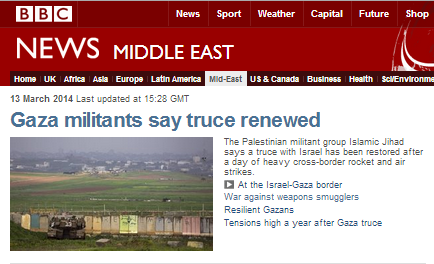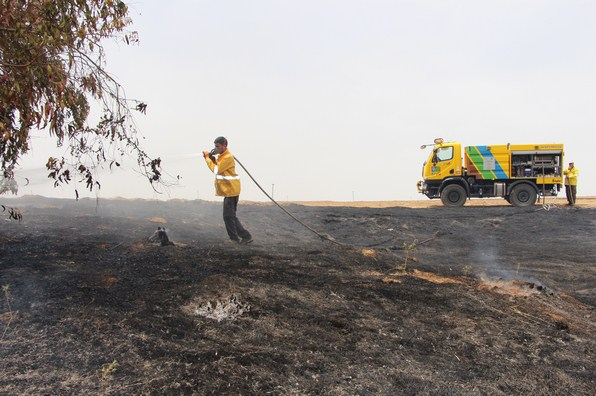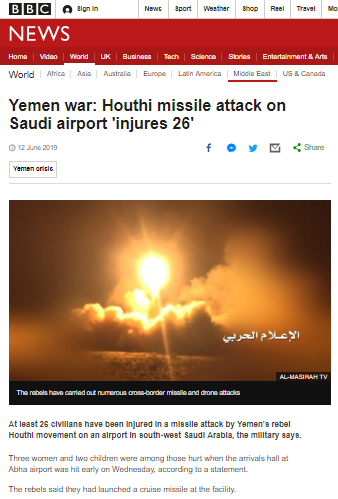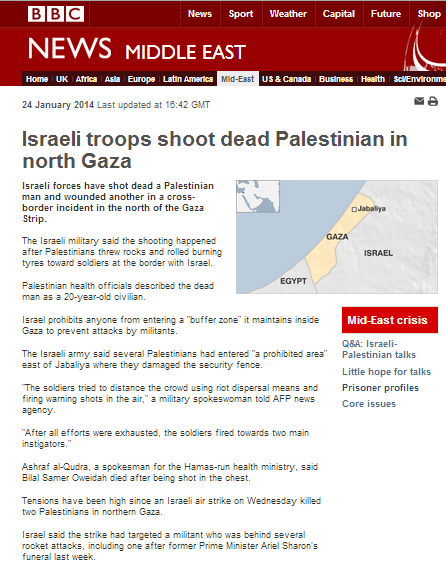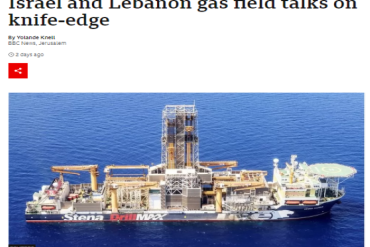On the afternoon of Thursday, March 13th, an article appeared on the BBC News website’s Middle East page under the heading “Gaza militants say truce renewed”.
Despite the fact that throughout the afternoon and evening terrorist groups in the Gaza Strip continued their missile attacks on  Israeli civilian targets, the article – titled “Gaza militants Islamic Jihad say truce renewed” – remained in situ and was not updated to reflect the realities on the ground. The report stated:
Israeli civilian targets, the article – titled “Gaza militants Islamic Jihad say truce renewed” – remained in situ and was not updated to reflect the realities on the ground. The report stated:
“On Thursday, at least two more rockets struck Israel, after which Israel attacked seven “terror sites” in Gaza. Three Palestinians were reported hurt.”
In fact, some seventeen missiles were fired at Israeli civilians throughout Thursday (most of them after the supposed truce took effect) in addition to over sixty-five the day before.
Notably, the BBC continues to insist upon using the euphemistic term “militants” to describe paramilitary groups deliberately targeting of civilians with military grade weapons and its description of the sites targeted in Israeli responses to that missile fire is presented in scare quotes, suggesting to audiences that there is room for doubt as to whether the sites concerned were actually connected with terrorism.
Clearly both those BBC practices do not contribute to accurate audience understanding of the events taking place and the absurdity of what can only be regarded as a policy decision to downplay terrorism is rendered even more apparent by the fact that the Palestinian Islamic Jihad’s concurrent PR campaign has included video evidence of indiscriminate attacks on civilians and of what it claims is a new underground missile launching system used to perpetrate those attacks.
Like the two BBC reports before it on the same topic, this article continues to uncritically amplify PIJ and Hamas propaganda concerning the reason for this latest round of missile attacks. The issue is presented to BBC audiences as one of ‘conflicting claims’ – despite the fact that video evidence of the PIJ’s mortar attack on a routine Israeli patrol along the border on March 11th produced by the PIJ itself has been available for days.
“Islamic Jihad said it fired the rockets in retaliation for Tuesday’s killing of three of its militants in an earlier Israeli air strike. Israel says it attacked the militants immediately after they launched mortars at Israeli soldiers.” […]
“Hamas did not take part in firing the rockets but accused Israel of provoking the attacks by Islamic Jihad.
AP quoted Hamas spokesman Sami Abu Zuhri as saying Israel bore “full responsibility” for the escalation.”
That BBC policy too is rendered absurd by the fact that the Palestinian Islamic Jihad’s Secretary General spoke openly from Tehran about the PIJ’s real aims as the attacks were ongoing.
The article ends with a description of remarks made by the president of the Palestinian Authority.
“The president of the Palestinian Authority in the West Bank, and a rival of Hamas, Mahmoud Abbas, condemned the violence.
Speaking during a meeting with British Prime Minister David Cameron on Thursday, Mr Abbas said: “Yesterday rockets were launched from Gaza and Israeli responded.
“We condemn the aggression and all forms of military escalation, including the rockets.” “
The BBC fails to inform audiences that the day before those particular remarks were made in the presence of the British prime minister, Abbas issued a statement on the subject in which he condemned only the Israeli reaction to the terror attacks and not the attacks themselves. Likewise, no mention is made of the fact that the Al Aqsa Martyrs Brigades – connected to the Fatah movement which Abbas also heads – claimed responsibility for several of the missile attacks in recent days. 
At some point the BBC News website apparently realised that its “truce renewed” article did not accurately reflect the situation and the above report was removed and replaced in the early hours of March 14th with one titled “Gaza militants and Israel exchange strikes despite ‘truce’“.
That report includes the same uncritical repetition of PIJ and Hamas propaganda as its predecessor and also uses punctuation to suggest to readers that the sites targeted by Israel might not in fact be terrorist infrastructure.
“The Israel Defence Forces (IDF) said about 60 rockets hit Israel on Wednesday.
It said eight more rockets struck Israel on Thursday, after which Israel attacked seven “terror sites” in Gaza.”
Both the above reports include filmed footage from March 13th (which also appeared separately on the BBC News website) of the BBC Jerusalem Bureau’s Quentin Sommerville explaining the situation to BBC television news audiences.
In that report audiences were informed through the use of a qualifying idiom that they could decide for themselves whether or not one of the Israeli towns under missile attack was a “target”: 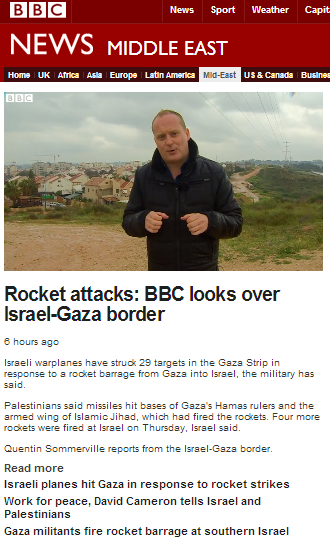
“If you just look down here – this is the town of Sderot. This is…ah…the target – if you like – for many of those rockets.” [emphasis added]
The BBC’s reporting of three days of missile attacks on Israeli civilians has been notable for the fact that it has failed to provide adequate background information which would enable audiences to properly comprehend the context of this latest escalation. The subject of Hamas’ weakened domestic and regional stature and the resulting power struggles has been ignored. PIJ and Hamas propaganda has been amplified without question and terrorism systematically downplayed.
Notably too – despite the fact that a BBC correspondent stood on a hill meters away from the town of Sderot – the voices of thousands of Israeli civilians whose lives have been blighted by missile attacks perpetrated by terrorist organisations in the Gaza Strip for well over a decade have, once more, not been heard by BBC audiences.
Related Articles:
BBC News amplifies Palestinian Islamic Jihad’s PR line on attacks against Israeli civilians


